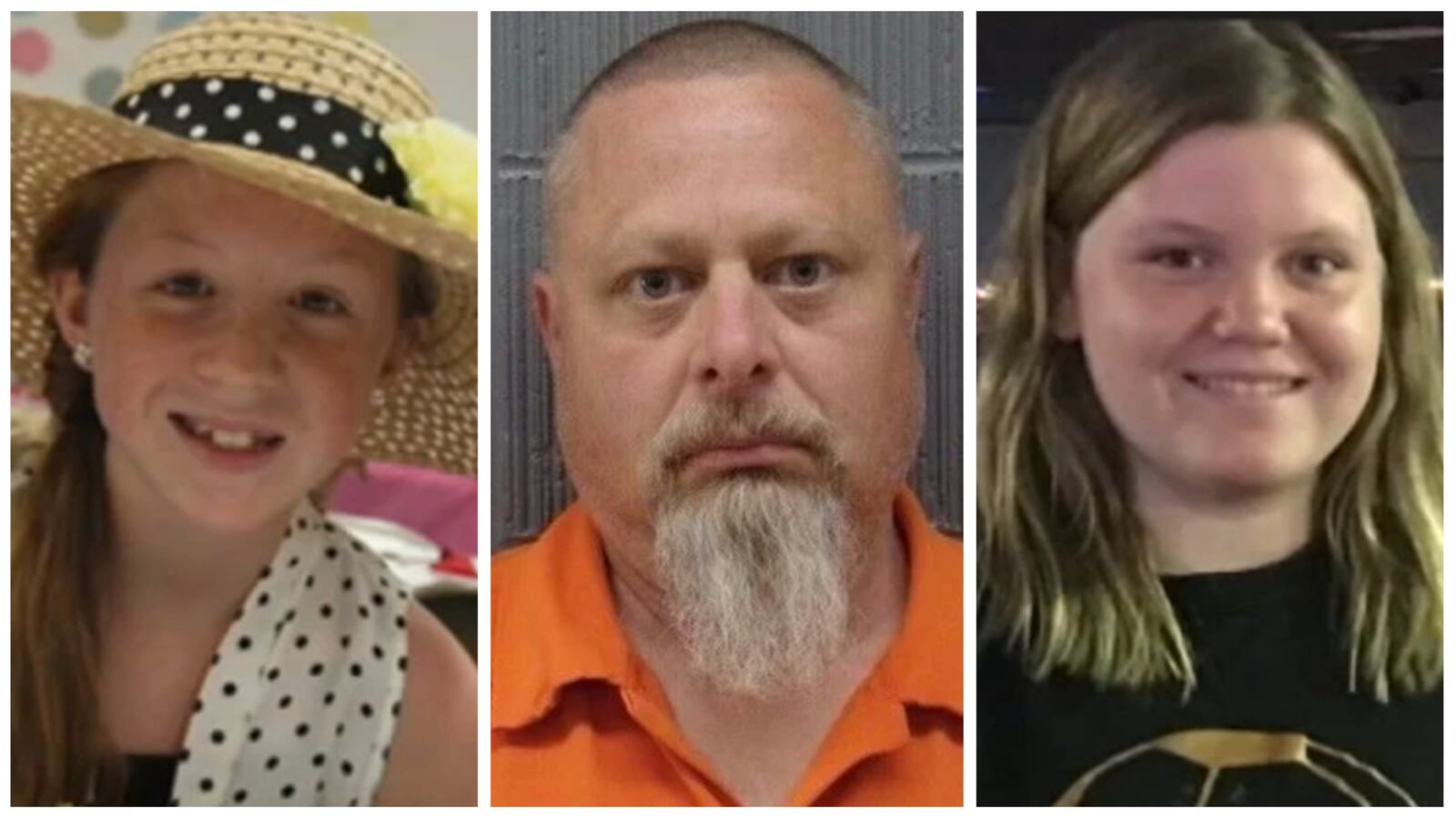An unspent .40-caliber round discovered between the bodies of two young girls found dead on an Indiana hiking trail in 2017 led investigators to their alleged killer half a decade later, according to a probable cause affidavit unsealed Tuesday.
A forensic examination showed the still-live bullet had been “cycled through” a Sig Sauer P226 owned by Richard Matthew Allen, who was charged last month with murder in the deaths of Delphi teens Libby German and Abby Williams.
Allen, a 50-year-old father of two who worked as a pharmacy technician at a local CVS in Delphi and was well-known around town, “did not have an explanation of why the bullet was found between the bodies of [German] and [Williams],” states the 12-page affidavit, which was ordered unsealed by Superior Court Judge Frances C. Gull.
Allen purchased the gun in 2001 and told investigators he “never allowed anyone to use or borrow it,” according to the affidavit.
German, 14, and Williams, 13, went out for a walk the day before Valentine’s Day 2017 and never returned home. Their remains were found the next day near a creek. Police said a couple of years later that they believed the perpetrator was someone who either lived or worked in the area, or visited frequently. After sifting through countless tips and interviewing multiple persons of interest, Allen was arrested in late October—although prosecutors have not ruled out the possibility that others were involved.
“I just couldn’t believe it when they said they arrested him,” bar owner Bob Matlock, a close friend of Allen’s, told The Daily Beast after Allen’s arrest was announced. “I said, ‘Well, that can’t be the Rick we know.’ And then we come to find out it was… There wouldn’t have been any inkling to anyone that knew him that would expect him to do something like that. He just didn’t seem that type of person. But… you never know.”
In addition to the ballistics evidence, the affidavit unsealed Tuesday reveals other previously unknown details surrounding the shocking double murder, which continues to haunt the tiny town of Delphi.
Investigators believe German and Williams were dropped off shortly before 2 p.m. near an entrance to the Monon High Bridge Trail, where they planned to hike on Feb. 13, 2017, according to the affidavit.
A brief video later found on German’s cellphone captured a white man in a blue jacket walking on an abandoned railroad bridge at 2:13 p.m.. In audio later released by police, the man can be heard saying, “Guys, down the hill.”
But the newly unsealed affidavit reveals one of the girls could also be heard saying, “Gun,” as the man approached them, prior to ordering them down the hill.
“[German] and [Williams’] deaths were ruled as homicides,” the affidavit states. “Clothes were found in the Deer Creek belonging to [German] and [Williams], south of where their bodies were located. There was also a .40 caliber unspent round … between [German] and [Williams’] bodies. The round was unspent and had extraction marks on it.”
Investigators also interviewed three young girls who said they encountered a “kind of creepy” man in a blue jacket on the same trail that day. One of the group said she said hello to the man, who glared at her and kept walking, according to the affidavit.
The man, who the affidavit says matched the man in the cellphone video, “was walking with a purpose like he knew where he was going,” one of the witnesses said.

A man was captured on a brief video on German’s cellphone wearing a blue jacket and walking on an abandoned railroad bridge at 2:13 p.m. on Feb. 13, 2017.
FBIA woman who was on the trail that day as well also told police she remembered encountering a man wearing a blue jacket who matched the man in the video. The unnamed woman said she recalled seeing “no other adults” on her walk besides the man, who had parked his car in an “odd” manner at an old Child Protective Services (CPS) building near the trail entrance.
“She stated it was not odd for vehicles to be parked there but she noticed it was odd because of the manner [in which] it was parked, backed in near the building,” the affidavit says.
Another tip came in from a man who said he had been driving by the CPS building that day and spotted a “Purple PT Cruiser or a small SUV type vehicle” parked there that “appeared as though it was backed in [so] as to conceal the license plate.” Someone else described the vehicle as perhaps a “Smart car.”
And a motorist informed detectives that she had seen a man in a blue jacket walking along a road near the trail entrance on Feb. 13, and that he appeared “muddy and bloody,” according to the affidavit.
The man investigators believe was Allen was not seen again on the trail after 2:13 p.m., “because he was in the woods with [German] and [Williams],” it continues, adding he then walked back to his car along County Road 300 North.
Investigators also reviewed past tips, and homed in on an interview another officer had conducted with Allen in 2017.
Allen claimed he had been on the trail between 1:30 p.m. and 3:30 p.m. on Feb. 13, and that he had seen “three females” while walking the Freedom Bridge on his way to the High Bridge. He said he hadn’t interacted with them at all, and said he was “watching a stock ticker on his phone as he walked,” the affidavit states.
Investigators dug into Allen’s personal history, and found he owned a 2016 Ford Focus, which can look “similar in nature” to a PT Cruiser, small SUV, or Smart, according to the affidavit.
On Oct. 13, 2022, investigators questioned Allen, who stuck to his story. He insisted he hadn’t seen anyone on the trail that day back in 2017 other than “the juvenile girls” near the Freedom Bridge. Allen said he owned guns, and that he kept them at home.
That same day, investigators executed a search warrant at his house and located “jackets, boots, knives and firearms, including a Sig Sauer, Model P226, .40 caliber pistol with serial number U 625 627,” the affidavit states.
Over the next five days, the Indiana State Police crime lab tested the weapon, and “determined the unspent round located within two feet of [the girls’ bodies] had been cycled through Richard M. Allen’s Sig Sauer Model P226.”
Allen was at a total loss to explain how an unused bullet from that very gun wound up beside two dead bodies.
“He again admitted that he was on the trail but denied knowing [German] or [Williams] and denied any involvement in their murders,” says the affidavit.
Prosecutors in Carroll County, where Allen lives and the crime occurred, had asked for the probable cause affidavit to remain sealed.
In a Nov. 22 unsealing hearing, defense attorney Andrew Baldwin argued that releasing the affidavit would raise “more questions than answers.” At the same time, Baldwin called the details contained within “nothing for us to worry about.”
“The Court finds that the public interest is not served by prohibiting access, and that the protection and safety of witnesses can be ensured by redacting their names from the Affidavit, and that the defendant's personal information can be removed from the Charging Informations,” Gull wrote in her unsealing order.
Baldwin and co-counsel Brad Rozzi have asked the court to move Allen’s trial at least 150 miles out of town.
In a motion filed Monday, they argued, “It is common sense to presume that residents from counties further away from Carroll County will not have the same level of investment in the case and therefore will be able to more fairly decide the matter without concern about how their verdict may affect their relationships with other Carroll County residents.”
Allen is due back in court Feb. 17.







